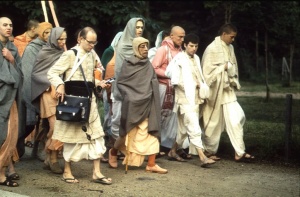CC Madhya 6.182: Difference between revisions
m (1 revision(s)) |
No edit summary |
||
| Line 1: | Line 1: | ||
{{ | [[Category:Sri Caitanya-caritamrta - Madhya-lila Chapter 06|C182]] | ||
<div style="float:left">'''[[Sri Caitanya-caritamrta|Śrī Caitanya-caritāmṛta]] - [[CC Madhya|Madhya-līlā]] - [[CC Madhya 6|Chapter 6: The Liberation of Sārvabhauma Bhaṭṭācārya]]'''</div> | |||
<div style="float:right">[[File:Go-previous.png|link=CC Madhya 6.181|Madhya-līlā 6.181]] '''[[CC Madhya 6.181|Madhya-līlā 6.181]] - [[CC Madhya 6.183|Madhya-līlā 6.183]]''' [[File:Go-next.png|link=CC Madhya 6.183|Madhya-līlā 6.183]]</div> | |||
{{CompareVersions|CC|Madhya 6.182|CC 1975|CC 1996}} | |||
{{RandomImage}} | |||
==== TEXT 182 ==== | ==== TEXT 182 ==== | ||
<div | <div class="verse"> | ||
māyāvādam asac-chāstraṁ | :māyāvādam asac-chāstraṁ | ||
pracchannaṁ bauddham ucyate | :pracchannaṁ bauddham ucyate | ||
mayaiva vihitaṁ devi | :mayaiva vihitaṁ devi | ||
kalau brāhmaṇa-mūrtinā | :kalau brāhmaṇa-mūrtinā | ||
</div> | </div> | ||
| Line 14: | Line 18: | ||
==== SYNONYMS ==== | ==== SYNONYMS ==== | ||
<div | <div class="synonyms"> | ||
''māyāvādam''—the philosophy of Māyāvāda; ''asat-śāstram''—false scriptures; ''pracchannam''—covered; ''bauddham''—Buddhism; ''ucyate''—it is said; ''mayā''—by me; ''eva''—only; ''vihitam''—taught; ''devi''—O goddess of the material world; ''kalau''—in the Age of Kali; ''brāhmaṇa-mūrtinā''—having the body of a ''brāhmaṇa''. | |||
</div> | </div> | ||
| Line 21: | Line 25: | ||
==== TRANSLATION ==== | ==== TRANSLATION ==== | ||
<div | <div class="translation"> | ||
“[Lord Śiva informed goddess Durgā, the superintendent of the material world:] ‘In the Age of Kali I take the form of a brāhmaṇa and explain the Vedas through false scriptures in an atheistic way, similar to Buddhist philosophy.’” | “[Lord Śiva informed goddess Durgā, the superintendent of the material world:] ‘In the Age of Kali I take the form of a brāhmaṇa and explain the Vedas through false scriptures in an atheistic way, similar to Buddhist philosophy.’” | ||
</div> | </div> | ||
| Line 28: | Line 32: | ||
==== PURPORT ==== | ==== PURPORT ==== | ||
<div | <div class="purport"> | ||
The word brāhmaṇa-mūrtinā in this verse refers to the founder of Māyāvāda philosophy, Śaṅkarācārya, who was born in the Mālabara district of southern India. Māyāvāda philosophy states that the Supreme Lord, the living entities and the cosmic manifestation are all transformations of illusory energy. To support this atheistic theory, the Māyāvādīs cite false scriptures, which make people bereft of transcendental knowledge and addicted to fruitive activities and mental speculation. | The word ''brāhmaṇa-mūrtinā'' in this verse refers to the founder of Māyāvāda philosophy, Śaṅkarācārya, who was born in the Mālabara district of southern India. Māyāvāda philosophy states that the Supreme Lord, the living entities and the cosmic manifestation are all transformations of illusory energy. To support this atheistic theory, the Māyāvādīs cite false scriptures, which make people bereft of transcendental knowledge and addicted to fruitive activities and mental speculation. | ||
This verse is a quotation from the Padma Purāṇa, Uttara-khaṇḍa (25.7). | This verse is a quotation from the ''Padma Purāṇa'', ''Uttara-khaṇḍa'' (25.7). | ||
</div> | </div> | ||
__NOTOC__ | |||
<div style="float:right; clear:both;">[[File:Go-previous.png|link=CC Madhya 6.181|Madhya-līlā 6.181]] '''[[CC Madhya 6.181|Madhya-līlā 6.181]] - [[CC Madhya 6.183|Madhya-līlā 6.183]]''' [[File:Go-next.png|link=CC Madhya 6.183|Madhya-līlā 6.183]]</div> | |||
__NOTOC__ | |||
__NOEDITSECTION__ | |||
Revision as of 17:17, 29 July 2021

A.C. Bhaktivedanta Swami Prabhupada
TEXT 182
- māyāvādam asac-chāstraṁ
- pracchannaṁ bauddham ucyate
- mayaiva vihitaṁ devi
- kalau brāhmaṇa-mūrtinā
SYNONYMS
māyāvādam—the philosophy of Māyāvāda; asat-śāstram—false scriptures; pracchannam—covered; bauddham—Buddhism; ucyate—it is said; mayā—by me; eva—only; vihitam—taught; devi—O goddess of the material world; kalau—in the Age of Kali; brāhmaṇa-mūrtinā—having the body of a brāhmaṇa.
TRANSLATION
“[Lord Śiva informed goddess Durgā, the superintendent of the material world:] ‘In the Age of Kali I take the form of a brāhmaṇa and explain the Vedas through false scriptures in an atheistic way, similar to Buddhist philosophy.’”
PURPORT
The word brāhmaṇa-mūrtinā in this verse refers to the founder of Māyāvāda philosophy, Śaṅkarācārya, who was born in the Mālabara district of southern India. Māyāvāda philosophy states that the Supreme Lord, the living entities and the cosmic manifestation are all transformations of illusory energy. To support this atheistic theory, the Māyāvādīs cite false scriptures, which make people bereft of transcendental knowledge and addicted to fruitive activities and mental speculation.
This verse is a quotation from the Padma Purāṇa, Uttara-khaṇḍa (25.7).